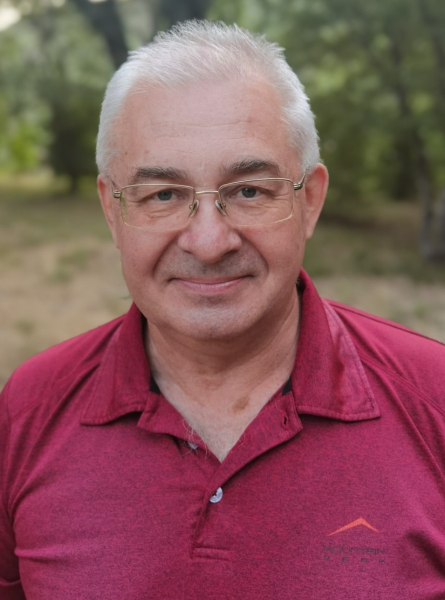Alexey Vyacheslavich Trufanov
Associate Professor
Institute of Earth Sciences

Research interests:
Specialization in the field of "Molecular thermobarogeochemistry, experimental Mineralogy and Geotechnology", spending a large amount of field and experimental studies in the field of metallogeny of sedimentary and metamorphic complexes of the South of Russia, forecasting and assessment of new types of mineral raw materials.
Research projects:
Theoretical and experimental validation of autoclave methods of extraction of impurity elements and high-carbon products from waste mining and processing of coal and other minerals.
Monitoring changes of landscape ecological environment, assessment of resource potential of technogenic formations and wastes, development of technology of their use and reducing negative impacts on the environment of the Azov-black sea basin.
Teaching:
-
Safety while conducting geological exploration
The main factors of emergencies in the performance of various types of geological exploration works, and also discusses specific measures aimed at reducing the risk of formation of hazardous situations, preparedness for effective and safe operation in the event of possible accidents, natural disasters and disasters of natural, technological, environmental, and social orientation.
-
Bases of development of deposits of solid minerals
The purpose of learning is getting the students knowledge of geotechnological methods of mining of solid minerals, including unconventional methods of underground gasification, SWE-ganiya, leaching and other physico-chemical technologies of production, transport and storage of ores. Objectives of learning: - learning principles, types and methods of extracting of mineral deposits; - introduction to the methodology of opening, preparation and mining of solid minerals, as well as with modern systems and means of mineral extraction; - acquisition of skills of drawing up design documentation and calculation of obtained mineral into dedicated operational and quality units taking into account real geological situation.
-
The basics of forecasting, prospecting and exploration of mineral deposits
The development of the discipline is mastering the techniques of prospecting, evaluation and exploration of industrial types of mineral deposits, study of the search criteria and indication of detection of ore occurrences and mineral deposits, development of methods and techniques for sampling of bodies of minerals, mastering the technique of contouring the bodies of minerals, the evaluation of forecast resources and calculation of the projected reserves, the study of the principles of preparation of geological projects for the production of search, appraisal and exploration work.
-
Fundamentals of thermobarogeochemical
The purpose of teaching the discipline is the study of thermobarogeochemical, students ' acquisition of fundamental knowledge about the nature and physico-chemical parameters of mineral-forming and ore-forming fluids involved in the formation of mineral deposits, obtaining practical skills in the use of fluid inclusions in the search, evaluation and exploration of industrially important accumulations of minerals in the earth's crust.
-
Bases of technology of processing of ores
The purpose of learning is getting the students knowledge about the technological properties of the main types of rocks and ores, and the methods of their processing with the purpose of extraction of valuable components and produce high-quality concentrates that meet the requirements of modern industry, with minimal losses of minerals. Tasks of the discipline. - familiarization with the basic technological properties of rocks and ores as well as the technological indicators of enrichment; - obtaining information about the main types and methods of ore concentration, based on their specific physico-mechanical properties and familiarization with auxiliary technological processes associated with enrichment; - the study of the principles of drawing up technological schemes of enrichment of the main types of minerals.
-
Testing of minerals
The main purpose of the development of this discipline is getting the students knowledge about the methods of testing various geological objects, which is the basis to determine the boundaries of ore bodies, and exploring quality mineral, i.e., determine its composition and properties, defining field of use, method of processing and economic importance. Objectives of learning: - learning principles, types and methods of testing of different geological objects; - introduction to the methodology of compiling primary and summary documentation in the process of testing; - acquisition of skills of drawing up of schemes of reduction of the samples and their preparation for analytical studies.
-
Geoecological problems of the exploration and development of mineral deposits
This discipline refers to the special discipline studied in the training of specialists in "Applied Geology". It is one of the most important disciplines which have a significant effect on the formation of professional knowledge and skills necessary for the modern geologist. The study of the discipline includes lectures, laboratory classes, independent work of students, control tests knowledge of current and intermediate attestation of the exam. The purpose of teaching of discipline - acquiring the necessary information about the impacts of exploration on the environment, modern methods of planning and management, and restoration of disturbed lands and reduce the negative impact of mining on the environment. Learning objectives of discipline: * to learn General information about the impact of the major types of mining activities on the environment; * to acquaint with basic methods of research and forecasts of the impact of mining on the environment; * to study the rational methods of mining with the use of protective measures aimed at reducing the negative impact of exploration; * obtain the necessary understanding of the legal framework for environmental protection in mining;


